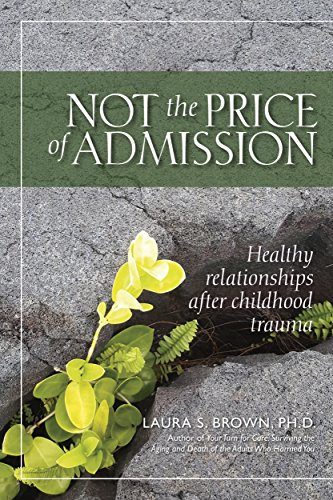
Not the price of admission: Healthy relationships after childhood trauma

there is no legitimate price of admission to emotionally-meaningful relationships. Not having a price of admission doesn’t mean that relationships are simple or free from conflict. You have to work at having the real thing. You don’t get to be happy together forever like love songs promise without putting your heart, soul, and intention into
... See moreLaura S. Brown • Not the price of admission: Healthy relationships after childhood trauma
Conflict doesn’t mean that love is absent. Quite the contrary. It means that two people are trying to make connection better by working through things that are obstacles to connection flourishing. Conflict means you can say, “I don’t like what you did,” or “That hurts a lot,” without an inherent risk of disconnection or punishment.
Laura S. Brown • Not the price of admission: Healthy relationships after childhood trauma
Repaired ruptures are places where you can return and say, “Remember when? Remember how we got through this and were even better than before?”
Laura S. Brown • Not the price of admission: Healthy relationships after childhood trauma
“In the best outcome (injuries) become integrated into couples’ attachment stories as demonstration of renewal and connection.”
Laura S. Brown • Not the price of admission: Healthy relationships after childhood trauma
Conflict is contact. Avoidance of conflict is avoidance of connection. Conflict also sucks. You have to continuously practice skills of emotion regulation, self-soothing, and interrupting the narratives that attempt to turn distress with each other into evidence that there is a price for this relationship.
Laura S. Brown • Not the price of admission: Healthy relationships after childhood trauma
When you don’t have to be perfect to have connection, you can stop explaining why you aren’t perfect. You aren’t. It’s as simple as that—and it’s almost intolerably difficult to stop apologizing for being imperfect.
Laura S. Brown • Not the price of admission: Healthy relationships after childhood trauma
The paradox is, when you can be vulnerable in a safe-enough context, greater closeness is a logical outcome. Openness leads to closeness. The amazing moments of wordless bliss that occur from time to time in good-enough romantic relationships are fed by healthy resolution of conflicts. Each person takes a risk to be known, seen, and imperfect—and
... See moreLaura S. Brown • Not the price of admission: Healthy relationships after childhood trauma
When you grew up in a family where someone had to be right and someone wrong—where blame was both inevitable and usually placed on you—the idea that you can do something displeasing to a person you care about and they will still like you, love you, and want to relate to you when the brief storm of their distress passes seems foreign at first,
... See moreLaura S. Brown • Not the price of admission: Healthy relationships after childhood trauma
When you call someone names or label them, you can’t have a good-enough connection.